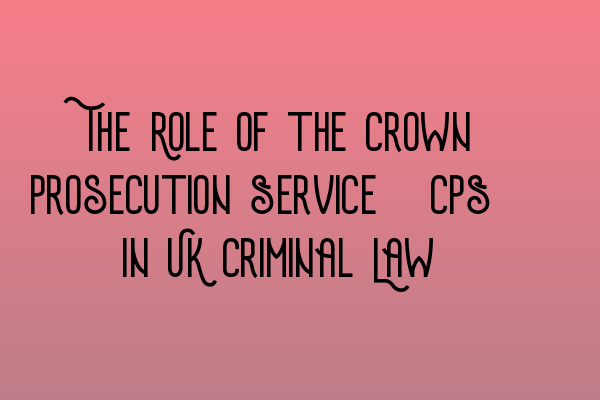The Role of the Crown Prosecution Service (CPS) in UK Criminal Law
When it comes to the criminal justice system in the United Kingdom, the Crown Prosecution Service (CPS) plays a pivotal role. As a solicitor specializing in criminal law, it is essential to have a comprehensive understanding of the CPS and its functions. In this blog post, we will delve into the responsibilities of the CPS and its significance in UK criminal law.
What is the Crown Prosecution Service (CPS)?
The Crown Prosecution Service (CPS) is the principal prosecuting authority in England and Wales. It is an independent government department responsible for bringing criminal charges and conducting prosecutions on behalf of the Crown. The CPS operates in accordance with the principles of fairness, impartiality, and the public interest.
The CPS works closely with the police forces, reviewing the evidence provided by the police and making charging decisions. Their role is to assess whether there is sufficient evidence to prosecute a suspect and whether it is in the public interest to do so.
Functions of the Crown Prosecution Service
The CPS has several key functions within the criminal justice system:
- Prosecuting Cases: The primary function of the CPS is to prosecute criminal cases in court. They handle a wide range of offenses, from minor offenses to serious crimes such as murder and fraud. The CPS works closely with the police and other agencies involved in the investigation and prepares the case for trial.
- Evidence Review: The CPS reviews the evidence gathered by the police to assess its quality and sufficiency. They examine whether there is enough evidence to provide a realistic prospect of conviction and whether it is in the public interest to pursue the case.
- Legal Advice: The CPS provides legal advice to the police during the investigation process. They advise on complex legal matters, including the interpretation of statutes, case law, and evidentiary issues. Their input helps the police in building a strong and legally sound case.
- Victim Support: The CPS is committed to ensuring that victims and witnesses receive the necessary support throughout the criminal justice process. They work closely with victim support organizations to provide guidance, updates, and assistance to those affected by a crime.
- Public Interest: The CPS operates on the principle that decisions should be made in the public interest. They consider factors such as the seriousness of the offense, the impact on the victim, and the potential risk to the public when determining whether to prosecute a case.
Significance of the Crown Prosecution Service
The role of the CPS in the UK criminal justice system cannot be overstated. It brings fairness, consistency, and expertise to the prosecution process, ensuring that justice is served. The CPS’s commitment to the principles of impartiality and the public interest helps maintain public confidence in the criminal justice system.
For solicitors specializing in criminal law, understanding the CPS and its functions is essential. It allows them to effectively navigate the legal system, provide accurate advice to clients, and ensure the best possible outcome for their cases.
If you’re interested in further developing your knowledge and skills in criminal law, we offer comprehensive SQE 1 and SQE 2 preparation courses. We also provide SQE 1 practice exam questions and practice mocks—FLK1 and FLK2. Stay updated with the latest SRA SQE exam dates to plan your preparation effectively.
For more information about our SQE preparation courses and helpful resources, visit our website: SQE 1 Preparation Courses and SQE 2 Preparation Courses.
